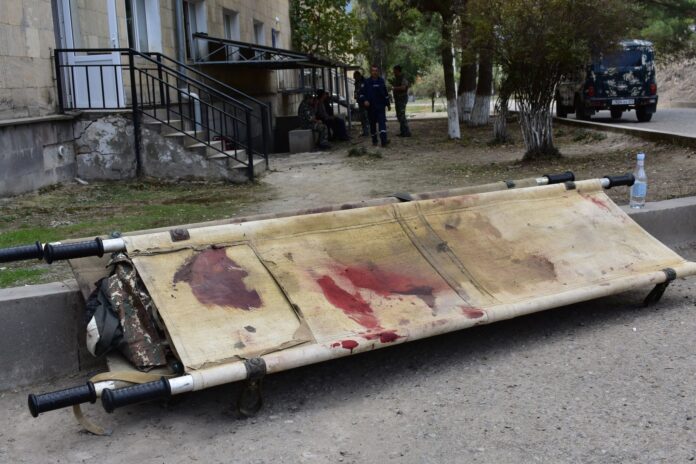Prime Minister Nikol Pashinyan is busy documenting the history of our days, or rather, revising our stupefying defeat in the Second Artsakh War. But that is the story for which he is directly and primarily responsible. He also is the malefactor and the first among the malefactors.
The Armenian people will never forgive Nikol Pashinyan. Parents whose 18-20 years old sons could have returned home had the Prime Minister stopped the war in time, will never forgive him. There was the possibility of stopping the war during the first few days of the 44-day disastrous war; in the first week of October, and then on the 19th of the same month.
The first and the main answerable to our defeat in this war is the current government led by Nikol Pashinyan, constituting the majority in the National Assembly; that is to say, the entire military-political elite of Armenia.
But much like in a victory, the defeat also has many who are answerable.
Among those who are responsible for our defeat in this war is Artsakh President Arayik Harutyunyan, the Defense Army, the ruling majority in the National Assembly, and the military-political leadership of Artsakh.
An attempt is being made to distance Artsakh from those responsible from Armenia. There can be no military, political or moral justification to do so. One cannot compose history as the political and party expediency allows. In the first of Artsakh war, during 1991-1994, everything possible was done not to share the laurels of victory with the authorities in Armenia during that time. Myths were been fabricated, academic books were written, films were made as if achieving that victory had nothing to do with Armenia and its military-political leadership.
One of the reasons for this defeat is also the opposition, which once again turned the Artsakh issue into a flag, accused the velvet leader of intending to sell lands, and left no room for healthy discussions on the Karabakh issue and the search for a dignified peace through compromises. When we say opposition, we mean first of all the former governments of Republic of Armenia and those who were affiliated with the authorities.
The first president Leon Ter-Petrosyan supported Serzh Sargsyan in 2017 for a very simple reason. Russia and the OSCE Minsk Group had made it clear since 2015 that the status quo was no longer tolerable. Their stand was also a green light for Azerbaijan to act. The April 2016 war was a test.
It is difficult to criticize Serzh Sargsyan claiming that his is mythical thinking. But it was surprising that he and the force he led accuse Pashinyan of conceding lands, just as we had reminded the third president, day and night for his continuous announcements for conceding seven regions to Azerbaijan. Serzh Sargsyan should have known and knew the impending catastrophe. But not only did he did not try to support Pashinyan, as Ter-Petrosyan had supported him in 2017, he undermined the PM’s authority, and he turned giving up land and handing over Artsakh into a rhetorical theme and his “mouthpiece”.
Under these conditions, what was left for Pashinyan, who came to power as a populist with the help of 70% of Armenians, if not declare in Stepanakert that “Artsakh is Armenia, and that is the end of it”? This statement was a call to Azerbaijan for war. This was followed by the Tavush adventure.
We have absolutely no intention to justify Pashinyan’s disastrous policy, the mistakes made during the 44-day war; but we must also understand that the disaster does not have only one responsible culprit.
The presidents and foreign ministers of Armenia and Artsakh, the military figures who, instead of settling the conflict, were busy prolonging it and thus keeping themselves in power, are also responsible. Vazgen Sargsyan, Robert Kocharyan, Samvel Babayan, Vartan Oskanian, Arkady Ghukasian, Bako Sahakian, Edward Nalbandian are responsible as well, because by freezing the resolution of the conflict they brought it to situation where the war had no other alternative.
The Armenian mentality, the parties that harbored the dream of Sevre; Diaspora organizations, the Armenian Apostolic Church, and other denominations have their share of responsibility as well. They were driven not by what was achievable, not by what we needed; but by an obsession and philosophy of getting everything, and thus with their propoganda obscured healthy discussions.
Not only did we not get everything, not only did we not get what we needed; we got nothing. We capitulated even though we sent 5,000 boys to the brink of death. Thousands were maimed. We lost almost as much as was possible to lose when we could keep 4.4 thousand square kilometers of Artsakh, as well as a region connecting Armenia and Artsakh in a secure land mass.
We could have left the six districts from a winning position, but we preferred the November 9 capitulation.
Those who shape public opinion and those who exert an influence in shaping public opinion are also responsible, including the author of these lines, who did not have the courage to write that mysticism, and all the ideologies that the state cannot implement today, is an adventure at the moment. It is a rejection of the state and statehood and a disaster for the Republic of Armenia and its longevity for Artsakh.
Of course, the opinion that we lost because we had an incompetent, demagogic, populist leader like Nikol Pashinyan can be part of the political debate; that if we had repopulated Artsakh and the surrounding areas; that if we had a national aspiration and we were not corrupt, we would not have won this war, much like we did not lose in 1991-1994.
Yes, there could not have been the Kars catastrophe in 1920, when the military-political leadership of the day, led by the ARF Dashnaktsutyun, lost 30,000 square kilometers of Armenia and then signed the capitulation of Alexandropol.
But it’s interesting as to why it is happening. And I cannot imagine what may not happen 100 years from now, in 2120.
It sometimes seems to me that I did not live in 1991-2020. Or I lived as a meaningless life.
As a citizen of the Republic of Armenia, I also have my responsibility and my guilt for the 44-day disaster. That haunts me every God given day.
Tatul Hakobyan
Tatul Hakobyan posted this on his Facebook page and read it. It is an emotionally charged and an introspective statement and by its scope and dept it is the first of its kind, hoping that it sets a trend in a national debate to find ways and means to move forward. The original is attached for those who would like to verify the authenticity of my translation to its original text. Vahe H. Apelian.













